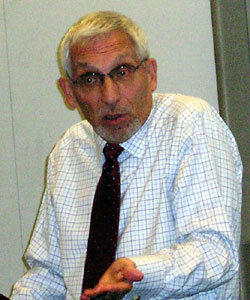|
||
| Return to CORP homepage |
Edward Zinbarg on Business Ethics:
|
|
Case Studies Zinbarg's latest book, Faith, Morals and Money, includes case studies that address real ethical issues such as truth in advertising, the sale of harmful products, buyers' responsibilities to sellers, board of director responsibilities, bribery, lenders and borrowers, misrepresentation by sellers, exporting jobs to less-developed countries and taking disciplinary action. His lecture included a live dialogue of a case study called the "new employment contract." In the case study, Anchor Corporation has been in business for 30 years as a computer outsourcer. Most of its customers are financial institutions, but for the past six years the company has tried to develop a manufacturing clientele in addition to its financial services market. The strategy has been unsuccessful, and now the company wants to concentrate again on its core financial market. But to do this the company must reduce its workforce by about 10 percent. The ethical dilemma involves deciding how to reduce the work force. The two key decision-makers are Abigail, the chairman of the company (played by Jill Raitt from RPP and MU's religious studies department), and Linda, the company president (played by Cyndi McDonald from MU's business school). Abigail is torn because she thinks of Anchor Corporation as a family and is most concerned with loyalty. She wants to keep the longer-employed workers and cut the ones most recently hired. Linda is younger and believes performance, not loyalty, is what matters most. The dialogue highlights the complexity of this ethical situation and how people from different religious traditions would make different decisions about whom to cut from the work force. Abigail's concern with loyalty suggests a covenantal approach to business relationships, while Linda's concern with performance signifies a contractual approach to business relationships. |
For 35 years he worked at Prudential Insurance Company in New Jersey before retiring in 1994. During this time, he climbed the career ladder in the business world and served as chief economist, chief investment officer for publicly traded securities and executive vice president-chief administrative officer. He also spent 15 years teaching finance at City University.
But Edward D. Zinbarg is not merely a business executive; he is also person of faith. Active in his Jewish congregation, Zinbarg recently earned a doctorate in religious studies from Drew University in Madison, N.J. His professional experiences have taught him that religious ethics and business success can go hand-in-hand.
"I am a strong believer in the social progress that comes with a vigorously competitive marketplace that rewards efficiency and effectiveness," he said, "but there must be boundaries." Zinbarg's recent book, Faith, Morals and Money: What the World's Religions Tell Us About Ethics in the Marketplace, provides a look at the compatibility of ethics and economics in a global system of trade.
On Oct. 5, 2004, Zinbarg spoke in Cornell Hall about his book and the importance of business ethics from the perspective of six major world religions: Judaism, Christianity, Islam, Hinduism, Buddhism and Confucianism. The lecture was presented by MU's Center for Religion, the Professions and the Public.
Zinbarg says his book offers practical guidance for "operating in a multicultural and multi-religious business world without forcing people to deny truths they hold dear."
"Business ethics is not a new thing," Zinbarg continued, adding: "These issues have been around for thousands of years, and the topic is still relevant. For example, the Bible says that even Moses, a man who was believed to have spoken directly to God, kept detailed financial records. And rabbinic interpreters of the text said that Moses had the records independently audited."
Zinbarg said we must ask what the great religions of the world have to say about this topic of great importance. "We must take our whole selves with us, including our religious beliefs, when we go into the marketplace, either as a seller, buyer, employer or employee," he said.
Zinbarg summarized the ethical systems of the six world religions and explained how the traditions have overlapping and interlocking views about business ethics. He also pointed out some specific emphases of each of these traditions.
In the Western World, Zinbarg says, Judaism addresses the pragmatic considerations of economic efficiency, Christianity concentrates on human dignity and Islam focuses on communal solidarity. In the Eastern religious traditions, Zinbarg associates Hinduism with humility and patience, Buddhism with compassion and Confucianism with reciprocity.
"Despite some differences in emphasis, I find it remarkable that the similarities outweigh the dissimilarities," he said.
Zinbarg explained that all six religions recognize that a seller must put his best foot forward, but insist that a seller must not deliberately deceive the buyer. They all recognize the hard realities of the marketplace, but insist that labor is not a commodity and humans must be treated differently from raw materials and machinery. They caution against selling harmful products, price gouging essential goods and damaging the natural environment. They denounce bribery and ask lenders to be willing to suspend legal rights to help a borrower in need.
"These principles are similar to secular ethics," he said, "but religious ethics gets at the gut." Zinbarg believes that whether religious or not, citizens should be concerned with business ethics because "we live in a global marketplace with diverse cultures and backgrounds of the people we're trading with. Billions of people have at their cultural and moral core a religious tradition," he said. "Moreover," he continued, "learning about other religions helps people better understand their own religious tradition and, in the process, discover unexpected common ground."
Katie Bauer is a master's student at the Missouri School of Journalism.
Links in archives are not maintained. |


